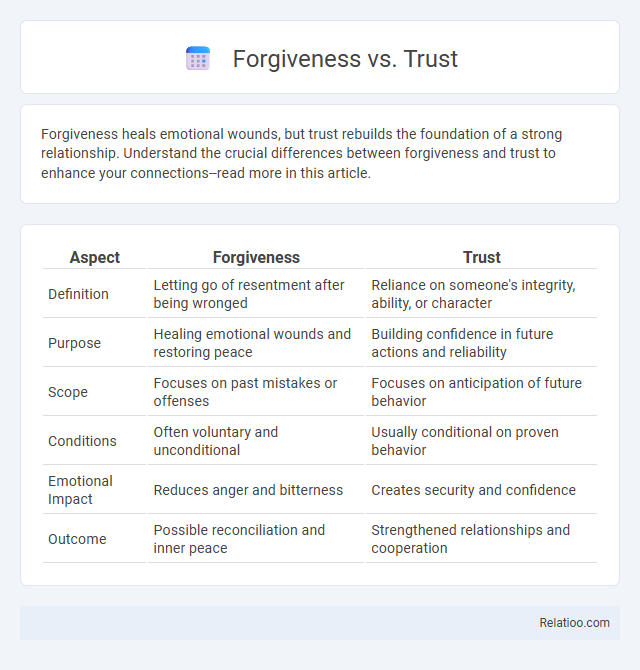Forgiveness heals emotional wounds, but trust rebuilds the foundation of a strong relationship. Understand the crucial differences between forgiveness and trust to enhance your connections--read more in this article.
Table of Comparison
| Aspect | Forgiveness | Trust |
|---|---|---|
| Definition | Letting go of resentment after being wronged | Reliance on someone's integrity, ability, or character |
| Purpose | Healing emotional wounds and restoring peace | Building confidence in future actions and reliability |
| Scope | Focuses on past mistakes or offenses | Focuses on anticipation of future behavior |
| Conditions | Often voluntary and unconditional | Usually conditional on proven behavior |
| Emotional Impact | Reduces anger and bitterness | Creates security and confidence |
| Outcome | Possible reconciliation and inner peace | Strengthened relationships and cooperation |
Understanding Forgiveness: Definition and Importance
Understanding forgiveness involves recognizing it as the intentional process of releasing resentment or anger toward someone who has caused harm, fostering emotional healing and personal growth. Forgiveness differs from trust, which requires consistent positive behavior and reliability to rebuild confidence in relationships; while forgiveness can be granted unilaterally, trust typically demands mutual effort and time. Emphasizing forgiveness's importance highlights its role in reducing stress, improving mental health, and paving the way for reconciliation without necessarily restoring trust.
Defining Trust: Foundation of Relationships
Trust forms the foundation of all healthy relationships by fostering reliability, honesty, and emotional safety between individuals. You build trust through consistent actions that demonstrate integrity and openness, enabling deeper connections and mutual respect. While forgiveness heals past wounds, trust creates the secure environment necessary for those wounds to fully mend and relationships to thrive.
Key Differences Between Forgiveness and Trust
Forgiveness involves letting go of resentment or anger towards someone who has caused harm, while trust requires confidence in someone's reliability and integrity. Key differences include that forgiveness is an internal emotional process focused on personal healing, whereas trust is an external expectation based on consistent behavior and proven honesty. Forgiving someone does not guarantee that trust will be restored, as trust needs time and evidence of change to rebuild fully.
The Psychological Impact of Forgiveness
Forgiveness significantly reduces stress, anxiety, and depression by promoting emotional healing and psychological well-being. Trust restoration often follows forgiveness, though it requires consistent positive behavior to rebuild a sense of security and safety. The psychological impact of forgiving includes enhanced self-esteem, improved interpersonal relationships, and a decreased risk of chronic stress-related illnesses.
How Broken Trust Affects Connections
Broken trust deeply undermines emotional bonds by creating feelings of betrayal and insecurity, which hinder open communication and mutual respect. The fragile nature of trust means that once damaged, it requires consistent effort and transparency to rebuild, yet forgiveness alone may not fully restore the original connection. This dynamic illustrates that while forgiveness can release resentment, rebuilding trust is essential for the durable health of relationships.
Can You Forgive Without Trusting Again?
Forgiving someone does not require you to fully trust them again, as forgiveness is about releasing resentment and finding inner peace. Trust is rebuilt gradually through consistent actions and time, separate from the initial act of forgiveness. You can choose to forgive without restoring trust immediately, prioritizing your emotional well-being while cautiously observing future behavior.
Rebuilding Trust After Betrayal
Rebuilding trust after betrayal requires consistent honesty, transparent communication, and reliable actions over time to demonstrate genuine change. Forgiveness involves releasing resentment and emotional pain, but it does not automatically restore trust, which must be earned through accountability and dependability. Your commitment to these principles plays a crucial role in healing relationships and facilitating long-term reconciliation.
Practical Steps to Practice Forgiveness
Practicing forgiveness involves acknowledging the hurt, expressing emotions honestly, and choosing to release resentment to promote healing. Building trust requires consistent honesty, reliability, and transparent communication over time to restore confidence. Differentiating forgiveness from trust means understanding that forgiving someone doesn't automatically reinstate trust, which must be earned through ongoing positive behavior and accountability.
The Role of Communication in Restoring Trust
Effective communication plays a crucial role in restoring trust after forgiveness by promoting transparency and understanding between parties. Your openness to express feelings and listen actively fosters a safe environment where trust can gradually rebuild. Consistent, honest dialogue helps clarify intentions, address misunderstandings, and reinforce commitment to change, making forgiveness more meaningful and trust more resilient.
Forgiveness and Trust in Personal Growth
Forgiveness is a critical step in personal growth, allowing individuals to release resentment and emotional burdens that hinder progress. Trust, while deeply connected, requires consistent actions over time to rebuild and solidify relationships after forgiveness occurs. Together, forgiveness and trust foster emotional healing and resilience, enabling healthier interpersonal connections and self-development.

Infographic: Forgiveness vs Trust
 relatioo.com
relatioo.com